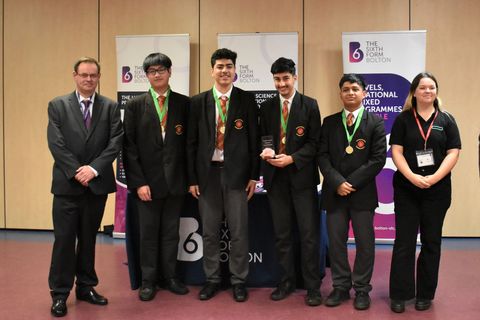Computing (AAQ)
Course overview
The Pearson Level 3 AAQ BTEC National in Computing (Extended Certificate) is a future-ready qualification that develops both the theoretical and practical skills needed in modern computing. You will study programming, networks and cyber security, human-computer interaction, and the development of software solutions. The course provides the ideal balance between academic study and applied computing practice, preparing you for university-level study or entry into computing careers
Entry requirements
Students studying three A Levels and/or AAQs will be expected to have a minimum of two GCSEs at grade 5 and three at grade 4, including English Language and Mathematics.
Students studying four A Levels will be expected to have a minimum of six GCSEs at grade 7, 8 or 9 including English Language and Mathematics at grade 6 or above.
Topics you will study
Programming Fundamentals – computing concepts, design methodologies and coding principles.
Computer Network Security and Encryption – understanding threats, regulations, encryption methods and defence strategies.
Human-Computer Interaction (HCI) – user experience (UX), user interface (UI) design and creating accessible, usable systems.
Practical Programming – applying software development principles to build and manage solutions
Key features
Equivalent to 1 A Level – study alongside two other A Levels.
Strong emphasis on programming, design and applied computing projects.
Builds critical transferable skills – problem-solving, analytical thinking, communication and project management.
Aligned with higher education courses in Computer Science, Software Engineering and Games Development
Assessment
Mix of external exams and internally assessed Pearson-set coursework projects.
Unit 1 Programming Fundamentals = External Exam
Unit 2 Computer Network Security and Encryption = External Exam
Unit 3 Human-Computer Interaction = Internal Assessment
Unit 4 Practical Programming = Internal Assessment
Exams test programming concepts, security and encryption.
Coursework projects focus on human-computer interaction and practical programming tasks.
Assessments are designed to reflect real-world scenarios and software development processes .
Enrichment and Work Experience
Students will be encouraged to:
Take part in coding workshops, hackathons and problem-solving competitions.
Work on real client-style briefs for programming and software development projects.
Undertake placements or shadowing in computing and IT industries.
Why choose B6?
Specialist teaching staff with expertise in programming and computing.
Access to modern computing labs and industry-standard development tools.
Excellent enrichment opportunities including coding clubs and industry links.
Proven pathways into Computer Science and Software Engineering degrees.
Future career opportunities
This qualification supports progression to university degrees such as:
BSc Computer Science
BSc Software Engineering
BSc Computer Games and Animation
It also provides career routes into:
Software Development
Cyber Security
Games Development
IT Consultancy
Systems Analysis
UCAS points awarded on the same tariff as A Levels.
Grades awarded from Distinction* to Pass, with Near Pass available for exams.
Related Courses
News
Local Secondary School Students Visit B6 for HPE Sponsored Code Challenge
B6 Principal, Stuart Merrills, Winning team members from Smithills School and Ruth Maycock from HPE
Sixth Form Bolton Students Excited to Secure Places on Medicine, Veterinary Science and Dentistry Degrees
Sixth Form Bolton Students Excited to Secure Places on Medicine, Veterinary Medicine and Dentistry
Business Students Raise Money for Local Charity
The Sixth Form Bolton students have been busy raising money for local charity Urban Outreach as







